
Wearing: LG’s KiZON child tracking device identifies the wearer’s location in real time.
Would you pick up your child’s smartphone and read their personal texts? Maybe search their internet history on their laptop while they’re asleep? Would you slip a tech device into their backpack so that you can secretly trace their every move?
The business of putting children under surveillance is growing. There’s now an arsenal of tech devices for parents to keep a virtual eye on their offspring 24 hours a day, seven days a week. But what does a parent’s piece of mind cost the children themselves?
Some of these devices are designed to discreetly sit in a child’s bag or backpack. Trax24 is one example and features GPS technology that allows a parent to track where their child is at all times. The parent can even receive alerts if their teenage driver exceeds the speed limit when on the road. We’ve all heard about helicopter parenting – now you can even be a backseat driver from the comfort of your own home.
There is also a range of wearable devices that shadow a child’s steps, track their heartbeat, and even deliver e-mails to their wrist. A new product launched in the US called FiLIP is a snap-around wrist band called that comes in bright colours (so kids might want to wear it) and uses GPS-tracking to allow parents to set safe zones the child is permitted to be in. It then alerts the parent when the child enters or leaves a designated area.
LG has a similar product called KizON, a wristband that identifies the child’s location in real time and then sends the information to the parents’ Android app. The parent can even communicate directly with their child through the device. If the child doesn’t answer the call within 10 seconds the call is connected anyway, allowing the parent to listen to whatever the child is doing through the built in microphone. LG doesn’t describe its new device as a surveillance tool but instead as the opportunity to extend the wearable device experience to parents with pre-school and primary school aged children.
These child-parent surveillance devices are being sold with the aim of helping parents have peace of mind (even if they bear a incredible similarity to the tagging devices used to trace criminals on partial release back into the community).
Other devices available for parents include a variety of spy sticks, software and cameras for mobile devices that download your child’s internet histories, e-mails and text messages – even the deleted ones. They also keep track of online activity, geographical location, and can even secretly video and audio record your child’s room.
It is understandable that parents want to ensure their child is safe and that they pay attention in class and reach their full potential. For parents who don’t want to come across as too overprotective, these surveillance devices might seem like the answer. However our attempts to protect our children in this secretive way may be crippling them instead.
Technology plays a big part in the modern world, and the ways we use it influences our lives, relationships and sense of worth. In the use of these surveillance gadgets we may be raising children to believe they’re not entitled to their own space and privacy, that a parent has every right to watch their every move.
These devices also don’t allow a child move through the world without a direct link of communication to their parent. While we mightn’t let a five-year-old make their own journey to the shops, trips like these are invaluable for older children as they develop their independence. In using these devices we’re demanding our children be accessible at all times for their own good. Or is it really for our own good?
There’s also the issue of data mining. While these devices are marketed as a private surveillance from parent to child, the information they collect could be invaluable to marketing and sales departments. There’s no guarantee that the fine print does not include some devious access to your child’s life.
Electronically tracking your child maybe the next frontier, but perhaps we should stop and think whether this frontier is one that’s truly worth entering. Just because technology is now capable of watching children’s every move doesn’t mean it’s the best option for parents.
Technology has a way of throwing up parenting challenges and these surveillance devices get right to the heart of the fine line between being responsible for your child and invading their privacy. Trust and mutual respect is important for strong parent-child relationships regardless of the tech devices that make their way to the market. Using these devices in families instigates a cycle of suspicion and anxiety, stripping children and parents of the opportunity to build a strong bond and mutual respect for each other.
Dr Joanne Orlando is a senior lecturer at the UWS School of Education who researches children’s techno lives. @joanneorlando
